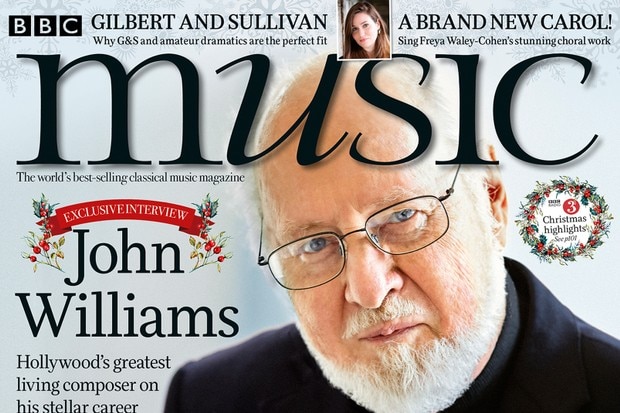BBC Music goes headless
mainThe Editor of BBC Music Magazine has unexpectedly resigned.
Normally, an editor’s departure is announced in the magazine. Here, it’s the subject of an email:
Hi all,
Hope all is well with you and yours.
I wanted to let you all know that after 17 successful years as Editor of BBC Music Magazine, Oliver Condy has stepped down from his role as of 14th May. As you know, Olly has overseen an extraordinarily successful period in the magazine’s history and made an enormous contribution to cementing its place as the world’s best-selling classical music magazine. I’m sure you will all join me in wishing Olly every success for the future and I thank him for all his efforts and hard work during his time in the role.
Jeremy Pound will pick up the mantle as Acting Editor while we embark on the recruitment process to find Olly’s permanent successor…
If you would like to contact Olly directly then his e-mail address is …
If anybody needs anything from me on this or anything else, as always, I am here.
All the best
Andrew
The magazine has suffered in the past couple of years from lack of advertising, both from live performance and from record companies.






Does this mean the end of a golden era in classical music altogether?
The email starts with “Hi all”. Enough said maybe. Or not. Whatever. As for the “world’s best-selling classical music magazine”. Ahem . . .
“Hi all” = a bunch “strategic” managers without strategy
Anybody remember Classic CD magazine?
Yes. I thought it was first class. The bleeding chunk extracts on the CD every month were particularly welcome.
Yes, Rob. I used to like the Beano when I was a kid and Classic CD looked a bit like it so I tried it just for old times’ sake and gave it up shortly afterwards; like the poetry of William McGonagall, it was so awful that it was good. They were always pushing Steve Martland and Cecilia Bartoli – an article about her mentioned how she loved pasta… I still have a pile of them in the loft, which will shortly be dumped when I complete my huge clear-out this month.
I was an avid reader of Gramophone for about 40 years and then gave that up when it went downmarket on being sold off to Heseltine’s firm, I believe, which was printing magazines like ‘Which Anorak’ and ‘Lawn Mower Buyer’ and which brought it into line with their house style.
I subscribed to that excellent magazine ‘International Record Review’ – minimal ads and a superb team of reviewers. That was started in 2000 by a deserter from Gramophone but ceased publication in 2015 on the demise of its owner.
I did buy the BBC Music Magazine for many years; I never thought that much of the content although it was quite a bargain by virtue of the cover CDs – but I let that go too eventually.
For me the very best record magazine is the American ‘Fanfare’, which I could buy in a London CD shop until that folded quite recently. It’s prohibitively costly if ordered from the USA so I am now without any record magazine.
I am loath to subscribe to anything else; if I do, I am sure that it too will either go downmarket or bankrupt!
Nooo…It’s not the end of Classical Music. Hopefully the new leadership will no longer bury their head in the UK classical sand. BBC Music Magazine recently listed the top 10 orchestras in the world. At the end I was LMFAO. One example,they listed the Halle Orchestra but no Cleveland. Well,look at the post in SD about the Cleveland 2021-22 schedule. Cleveland just broke the mold of standard orchestra programming and threw the gauntlet down at all other orchestras. BBC Music listed the LA Phil because of the “Dude.” There might have been one more American orchestra. I really should find the entire list. BTW,,,,the Halle Orchestra is a very fine orchestra but Top 10 in the World ? No! Gramophone mag has gotten a little better. I remember when I first got into classical. It was exactly the same time that the CD appeared. In fact,I have never bought a classical vinyl LP. So,for a newbie,Gramophone was a good place to start getting a handle on classical music. But since I live in the USA,one thing became very obvious. There was very little mention of American orchestras. Gramophone and all the other “good” CD guides were forced to acknowledge American orchestras as record labels started to release the old catalog and names like Szell,Ormandy,Reiner,Munch became unavoidable. Returning to BBC Mag,because of the internet etc,mags are becoming international entities and can’t remain nationally parochial. Hopefully,local newspapers will give greater focus to local orchestras but even music reviews,critics etc have become degraded quantitatively AND qualitatively. GOOD LUCK to the new leadership at BBC Music Magazine
Er…the standard of playing is good in US orchestras, but the playing style is very conservative, as is the repertoire they play most of the time. European orchestras play in a different style than US orchestras, and their playing is more “modern” (whatever that means).
So, it is quite natural that European critics might not much like how many US orchestras play. And that US audiences are perfectly happy with what they hear (or at least the board who fund them are happy).
It really isn’t a deliberate plot, but reflects differences in taste.
I am a long-time subscriber, also in the U.S. I am amazed they still include a covermount CD after all these years, and what 15 years or so after Gramophone discontinued theirs. I do listen to it from time-to-time but would understand if it were to be discontinued due to the added expense.
The CD is the main reason for me to buy the magazine, especially if it’s a BBC Phil release.
Streaming and MP3 simply do not meet any acceptable audiophile standard.
Compromised sound quality defeats the object of classical music.
Telling and an indicator that the magazine has been a shill for record companies: “The magazine has suffered in the past couple of years from lack of advertising, both from live performance and from record companies.”
I believe that’s a Slipped Disc comment, but I can well believe it. In addition, less than favourable reviews in certain mags have in the past led labels to withdraw their advertising.
That threat probably doesn’t have much effect on the BBC. It really doesn’t worry too much about how much money the magazine generates.
“The magazine has suffered in the past couple of years from lack of advertising, both from live performance and from record companies.”
That’s what happens when a magazine treats its advertisers with superiority and contempt. The editor sets the culture – let’s hope it changes, for the sake of the magazine; the industry would be poorer without it.
Oliver Condy did not single out advertisers for treatment with superiority and contempt. He treated everyone like that, not least potential contributors with track records in music journalism. His deputy seems to be following suit.